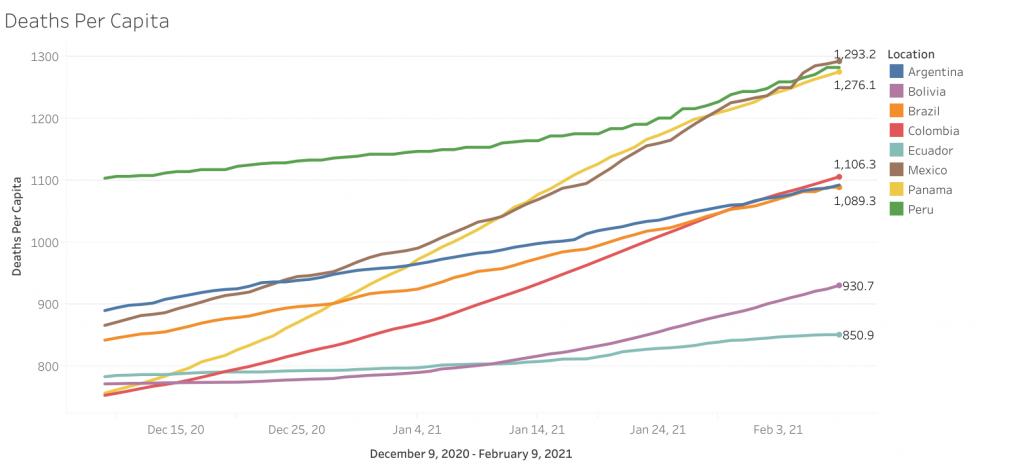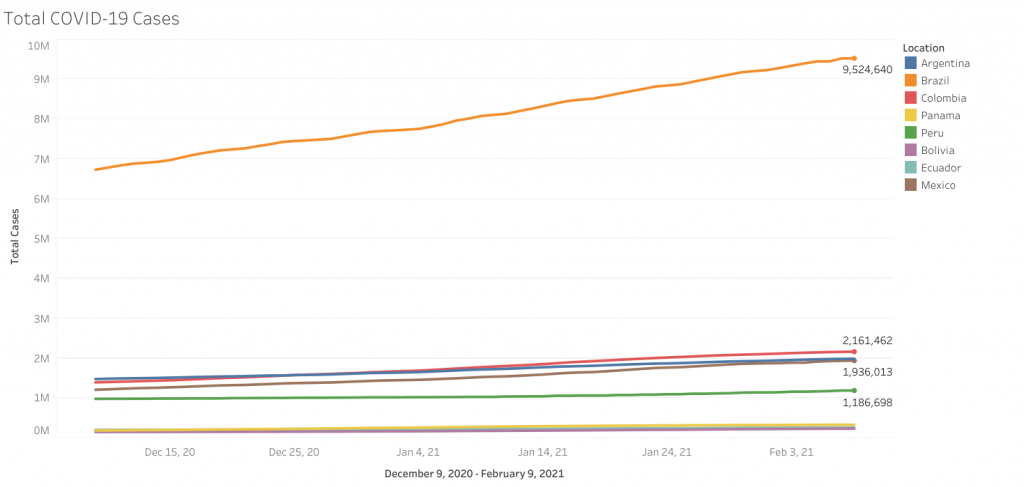What you should know
- New Variants: Researchers predict that in a month, the UK variant could become the predominant COVID-19 variant in the United States. Known as B.1.1.7, the variant is 30 to 40 percent more transmissible than the more common variants.
- Investment Outlook: According to the 2021 Milken Institute Global Opportunity Index, Chile ranks no.1 in Latin America for having the most potential to attract foreign investors. Uruguay, Costa Rica, Mexico, and Panama rounded out the top five.
- 4.1 Percent: The IMF predicts the region’s economy will grow 4.1 percent this year, but warned that a failure to contain COVID-19 will jeopardize that recovery.
- 52.9: Mexico surpassed Panama in terms of COVID-19 deaths per capita, reporting 59.2 deaths per million people, the highest number of deaths in Latin America. 8. Here are this week’s figures.
- Millennium Fellowship: The Application opens next week for the Atlantic Council’s Millennium Fellowship! More information below.
Health + Innovation
- Peru: On February 9, Peru began its first round of COVID-19 immunizations after receiving 300,000 vaccine doses from China’s state-owned Sinopharm. President Francisco Sagasti was vaccinated later in the day.
- Chile: On February 9, Chile surpassed the one million mark in COVID-19 vaccinations, solidifying its status as the region’s leader in inoculations. The country expects to vaccinate five million people by the end of March.
- Barbados: Barbados signed a commitment with AstraZeneca for 100,000 vaccine doses.
- Dominica: Prime Minister Roosevelt Skerrit announced that Dominica will receive a donation of 70,000 COVID-19 vaccine from India.
- Venezuela: The COVAX Facility set aside 1.4 million doses of the AstraZeneca vaccines for Venezuela, but it will not distribute them until Venezuela pays the $18 million it owes to the program. Nicolás Maduro previously announced a deal for 10 million doses of the Sputnik V vaccine without disclosing the cost or when they would be supplied.
- Brazil: Brazil’s Ministry of Health and the Fiocruz Institute opened a bidding process for the construction of a new biopharmaceutical complex. The complex is scheduled to begin operations in 2025 and will become Latin America’s largest biopharma complex.
- Mexico: By the end of January, Mexico had administered 670,000 COVID-19 vaccine doses.
Economies in focus
Academic and Multilateral Analysis
- The IMF forecasted that the region will not return to pre-pandemic output levels until 2023.
- A new study conducted by 18 organizations, including the World Bank, provides an in-depth view of the pandemic’s socioeconomic effects on low and middle-income countries worldwide. The study found that 87 percent of respondents in Colombia experienced a drop in income.
Economic Relief
- The Central American Bank for Economic Integration (CABEI) increased available credit for the purchase of COVID-19 vaccines to $4 million for the eight countries of the Central American Integration System.
- The CABEI also increased funding for the region’s financial institutions to $650 million for economic reactivation plans for small and medium-sized businesses.
Economic Impact
- Hedge funds are betting that the pandemic has damaged oil companies’ abilities to increase production to meet demand, pushing oil prices to multi-year highs. The Brent benchmark has increased 59 percent since news of successful vaccines broke in November.
- Despite the pandemic, Mexico received the most foreign tourists in 2020 among Latin American countries, though it received 47 percent less tourists than in 2019.
- Mexico’s economy grew by 3.1 percent in Q4 2020, but contracted by 8.5 percent year-on-year. According to President Andrés Manuel López Obrador, the country is 800,000 jobs short of pre-pandemic employment levels.
Quarantine + Travel Restrictions
Quarantine and Reopening Plans
- On February 8, commercial centers in Mexico City were allowed to resume unrestricted operations at 20 percent capacity. Food courts without outdoor seating remain open for carry-out only.
- Seven neighborhoods in Santiago, Chile, eased restrictions allowing citizens to move through the city without special permission. However, seven neighborhoods were once again placed under strict quarantine.
- Public schools in São Paulo, Brazil, resumed in-person classes after nearly a year. As many as 4,500 schools will gradually open their doors with up to 35 percent daily capacity.
International Travel Restrictions
- Cuba began requiring international travelers to quarantine on February 6. The measure applies to all travelers including diplomatic personnel, tourists, business leaders, and foreign correspondents.
- Canada further restricted nonessential travel, including requiring negative COVID-19 tests for all travelers seeking to enter the country, including at land borders. Air Canada has also suspended flights to Bogotá, Colombia, due to a surge in COVID-19 cases.
In Focus: Combatting Infodemic
- On February 8, Facebook announced its strictest stance yet against misinformation and disinformation: it will remove posts with false claims about COVID-19 and vaccines from Facebook and from Instagram.
- The tech giant is partnering with governments, multilateral organizations, and health organizations – such as the WHO – to determine a list of false or misleading vaccine claims. Facebook is also working with partners to deliver COVID-19 information through helplines on WhatsApp.
- The ban is part of a broader strategy by Facebook in response to years of controversy surrounding misinformation and disinformation that has been able to go viral on the platform. A company spokesperson said enforcing new rules will require time to train content moderators and systems to pay attention to pages, groups, and accounts on both Facebook and Instagram.
By the numbers
- Cases by country: Brazil (9,602,034) #3 worldwide, Colombia (2,302,051) #10 worldwide, Argentina (1,993,295) #12 worldwide, Mexico (1,936,013) #13 worldwide, Peru (1,91,221) #18 worldwide, Chile (758,189) #24 worldwide, Panama (327,654) #42 worldwide, Ecuador (259,783) #48 worldwide, Bolivia (229,187) #52 worldwide, Dominican Republic (224,538) #54 worldwide, Source: worldometers.info
- Prevalence rate (total cases per million people: Panama (75,222) #11 worldwide, Aruba (68,067) #13 worldwide, Brazil (44,979) #34 worldwide, Argentina (43,859) #37 worldwide, Colombia (42,313) #41 worldwide, Chile (39,457) #47 worldwide, Costa Rica (38,625) #51 worldwide, Peru (35,826) #55 worldwide, Saint Martin (31,589) #62 worldwide, Belize (30,026) #65 worldwide, Source: worldometers.info
- Deaths per capita (deaths per million people): Mexico (1,285) #18 worldwide, Peru (1,277) #20 worldwide, Panama (1,264) #21 worldwide, Colombia (1,103) #25 worldwide, Brazil (1,094) #27 worldwide, Argentina (1,091) #27 worldwide, Chile (993) #32 worldwide, Bolivia (923) #35 worldwide, Ecuador (847) #38 worldwide, Belize (764) #42 worldwide, Source: worldometers.info
Quick take


